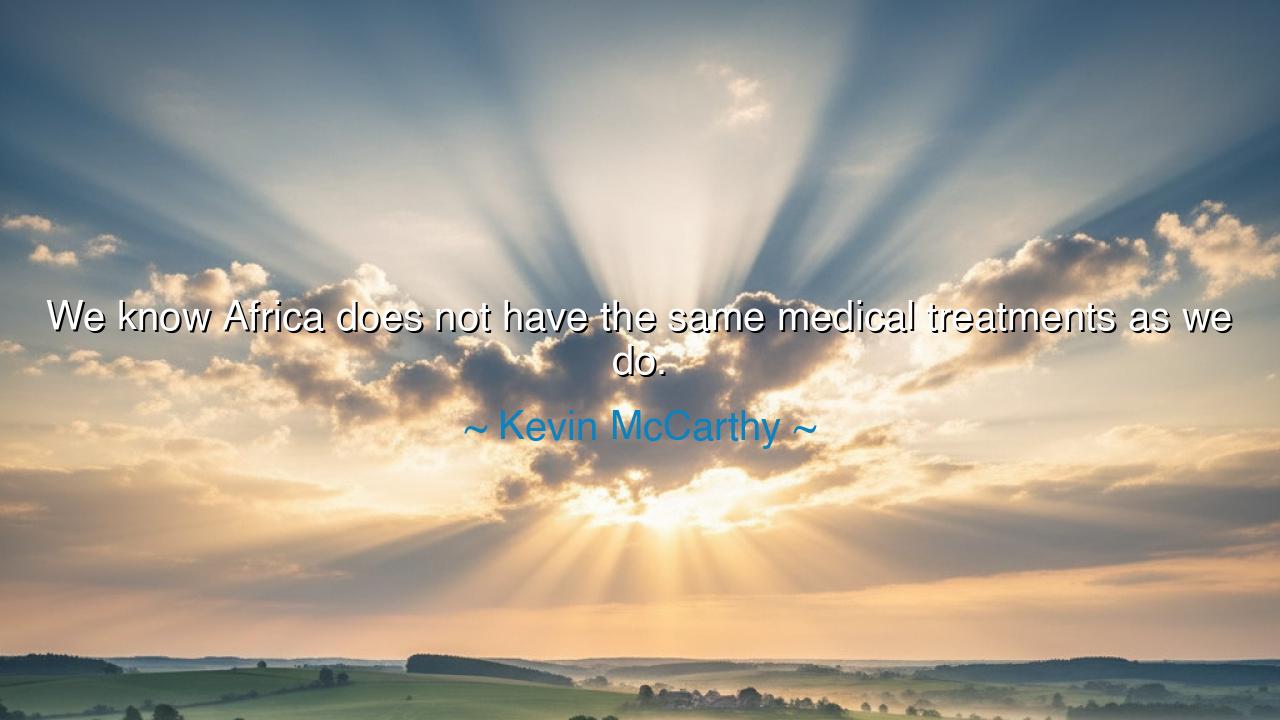
We know Africa does not have the same medical treatments as we






In the simple yet profound words of Kevin McCarthy, “We know Africa does not have the same medical treatments as we do,” we are called to recognize a stark and uncomfortable reality: the vast disparities in healthcare between different parts of the world. McCarthy’s quote serves as a reminder that while some nations enjoy advanced medical care, others are left to struggle with basic healthcare needs that remain unmet. This statement, though seemingly straightforward, carries with it an important call to action: to acknowledge the inequities in global healthcare and to take responsibility for ensuring that medical advancements reach all corners of the earth. McCarthy invites us to reflect on the privileges we hold, and in doing so, he challenges us to work toward global healing and equity.
The origin of McCarthy’s quote lies in the global context of healthcare disparities. Across the world, countries like those in Africa face challenges that are unimaginable in more developed nations, where medical treatments and technologies are readily available. These nations often struggle with underfunded healthcare systems, lack of access to basic care, and the absence of advanced medical infrastructure. McCarthy's statement calls attention to these inequities, bringing them into the open and urging those in more privileged regions to recognize their advantage and act on it. This is a call to action, asking us to turn our awareness into compassionate efforts to alleviate the suffering caused by these healthcare gaps.
In the ancient world, there was an understanding that health was not a right but a privilege afforded by certain societies. The Egyptians, for example, were ahead of their time in terms of medical practices, developing an early form of surgery, diagnosis, and hygiene. Their advanced knowledge of anatomy and medicine was applied primarily to their elite classes, while the common people had limited access to medical care. The Greek philosopher Hippocrates, often hailed as the father of medicine, believed in the healing power of nature, but even he was aware of the limitations in medical practice and the unequal access to healthcare that existed in his society. Just as McCarthy points out the stark contrast between medical care in Africa and more developed nations, the ancient world also understood that healthcare was often reserved for those who had the privilege to afford it or live in more advanced societies.
Consider the plague of Athens in 430 BC, where a devastating epidemic ravaged the population, and the medical community had little to offer in terms of effective treatments. While some citizens had the means to flee the city, those without resources were left vulnerable to the disease. The lack of effective medical treatment led to widespread death and despair, reminding us that healthcare disparities have always existed. The citizens of Athens were often unable to receive the care they needed, and the system was overwhelmed by the sheer magnitude of the crisis. This historical example serves as a reminder that even in ancient times, there were those who suffered simply because they lacked access to the necessary resources for survival, a reality still echoed in the world today.
McCarthy’s statement also calls attention to the moral obligation that those in privileged positions must feel toward those less fortunate. In the modern era, we have witnessed the rapid advancements in medical technologies, yet those in developed nations have far more access to these life-saving innovations than those in developing countries. Consider the example of Dr. Paul Farmer, a physician and anthropologist who dedicated his life to bringing healthcare to the poorest and most marginalized people in the world, particularly in Haiti. Farmer’s work through Partners In Health has brought antiretroviral drugs to countless people with HIV/AIDS, saving lives in a country where medical care was once scarce. His example shows that global health equity is achievable if we actively work to close the gap in healthcare access and provide the tools needed for healing.
The lesson of McCarthy’s words is one of awareness, responsibility, and compassion. By acknowledging the inequalities in global healthcare, we are called to act—to support initiatives that provide medical care to those who need it most, and to push for global health policies that prioritize equity and access. Just as Dr. Farmer brought care to the underserved, we must each seek ways to contribute to the broader effort of making healthcare accessible to all, regardless of their geography or economic status. The challenges are great, but as history shows, even the smallest acts of compassion and effort can create ripple effects that lead to profound change.
In our own lives, we can take McCarthy’s lesson to heart by recognizing the privilege we have in accessing medical care and health resources. Whether we are in a position to donate to healthcare causes, volunteer our time, or advocate for policies that ensure equitable care, we must take action. We must also remember that true global health is not just about curing diseases, but about ensuring that every person, regardless of where they live, has access to the care they need to thrive. Let us act with the same sense of responsibility that Dr. Paul Farmer embodied, and honor the legacy of the ancients, who taught us that compassion and equity are central to the survival and flourishing of all people.






AAdministratorAdministrator
Welcome, honored guests. Please leave a comment, we will respond soon